
It's about the idea, folks!
Lately on the internet, in blogs and on boards, I've read all kinds of insanity stating that the Canadiens will not be in fact 100 years old in 2009. It's a lot of drivel in most cases, and your guess is as accurate as mine would be in rendering what city most of it transpires from.
The reasons given for most of this nonsense stems from questions arising over the team and franchise's year and date of origin, the fact that the Canadiens original franchise was transferred to become the Toronto Tecumsehs in 1912, and that one season of NHL hockey that went unplayed.
The bottom line is that all of this right or wrong, is quite besides the point.
What remains unshakable is that the Canadiens were created on December 2, 1909, in a room at the Windsor Hotel in Montreal. The 2008-09 season will be their 100th in existence. They may not have played in 2004-05, but they were in business, making transactions and drafting players.
If it counts for anything, the Stanley Cup engraving as an official testament, does not skip over the unplayed season, just as when in 1919, influenza wiped out game 7 of the Cup final. For the 2004-05 season, the Cup reads "Season Not Played".
The centennial that the Montreal Canadiens are essentially celebrating, is not so much one of a 100 year old franchise, but that of an idea that was born in that Windsor Hotel room.
Mired in all the nonsesical crap I've waded through on the net, was an unusually excellent questioning of the Canadiens origins at a Bleacher Report article by Daniel Bigras. Entitled "Are the Canadiens really born on December 4, 1909?", the piece examined what is admittedly a very confusing birth by the franchise one hundred years ago.
 Bigras' piece is exploratory in nature, as he seeks out the finite truth inside the confused ownership transfer between the Ambrose O'Brien originated club from the Windsor in 1909 that existed for but one season, and the Canadiens team that was owned immediately afterwards by the Club Athlétique Canadien, operated by George Kendall Kennedy.
Bigras' piece is exploratory in nature, as he seeks out the finite truth inside the confused ownership transfer between the Ambrose O'Brien originated club from the Windsor in 1909 that existed for but one season, and the Canadiens team that was owned immediately afterwards by the Club Athlétique Canadien, operated by George Kendall Kennedy.As Bigras was kind enough to quote from an earlier article here at this site, I sent him off a comment clarifying what my own sources were for the information I had posted in it. From his piece, he says, "I have an appointment with the Quebec National Library in order to read the 'Trail of the Stanley Cup' by Charles Coleman, and also another, from Andy O’Brien, "The Story of the Montreal Canadiens'."
I am curious to hear what he comes back with. I have read both Jack Fella's "Quest For The Cup", and Andrew Podniek's "Lord Stanley's Cup", and I found that neither HHOF researched publication shed much light on the Habs questions. I usually prefer Montreal Canadiens specific researchers over anything the Hall slaps together.
 After my explanations at Bigras' posting, I thought readers here might want to be further informed as to this as well, as my reply might be a more in depth clarification of the Canadiens cloudy beginnings. So here is how I stated it in my comment"
After my explanations at Bigras' posting, I thought readers here might want to be further informed as to this as well, as my reply might be a more in depth clarification of the Canadiens cloudy beginnings. So here is how I stated it in my comment" "I just wanted to add that my sources for information on these dates and facts were culled from the book "La Glorieuse Histoire Des Canadiens" by Pierre Bruneau and Léandre Normand, published in 2002.
What the authors of this tome endeavored to accomplish was clarify many of the points first brought out in Claude Mouton's fine book from two decades prior. In looking to purchase either of these two books for referencing at my site, I held both in my hands and read through them thouroughly, before deducing that the latter 2002 work was the more detailed and accurate of the two.
In Bruneau and Normand's 743 page essay, they expand greatly on many of Mouton's facts, and I firmly believe that their book is the most complete reference guide available on the history of the Canadiens that has been published up to this point.
As for clarifying the questions brought up in your article, the present day Habs are in fact the one time Haileybury Comets.
It seems that for all intents and purpsoses, the franchise transactions that took place after the initial 1909-10 season, existed for the most part, on paper more than on the ice.
My take is that the original Canadiens franchise owned by Amrose O'Brien and hence suspended by the NHA after one season was promised to Toronto interests.
My calculated guess, and this is strictly IMO, is that it was the first of the dormant franchises transferred, as it had incurred the most debt of the disbanded teams. George Kendall Kennedy, because he owned the copyright on the "Canadiens" name, would have been handed the franchise that had incurred the least debt, and Hailybury's roster in 1909-10 was surely less expensive than Canadiens.
 The dormant Canadiens franchise most definitely became the Toronto Tecumsehs in 1912, and that was the franchise eventually owned by Eddie Livingstone. After several name changes and false starts, Livingstone killed off the Tecumsehs/Ontarios/Shamrocks entry, and then purchased the Blueshirts.
The dormant Canadiens franchise most definitely became the Toronto Tecumsehs in 1912, and that was the franchise eventually owned by Eddie Livingstone. After several name changes and false starts, Livingstone killed off the Tecumsehs/Ontarios/Shamrocks entry, and then purchased the Blueshirts.Upon the creation of the NHL in 1917, the Blueshirst were no longer Livinsgtone's - he still only owned a dormant Shamrocks club. Of course, the Blueshirts first morphed into the NHL Toronto Arena's, then the St. Patricks, and finally, our beloved rival Maple Leafs.
One last small clarification of note - quite trivial.
The original Canadiens franchise by O'Brien was in truth created on December 2, 1909, in a room at the Windsor Hotel in Montreal. The December 4 date, comes from the day it was announced to the media.
Jimmy Gardner, the owner of the Montreal Wanderers at the time, felt spurned by the owners of the CHA, a league that had been created just prior to the NHA. Without a league to play in, the Wanderers schemed with other teams in the CHA to disband it, and join the NHA instead. Needing a french rival team for the english Wanderers, Gardiner and O'Brien met on December 2 to finalize the creation of the original "Canadiens".
 So when all is said and tied together, several hazy points are clarified in my esteem. Here's why.
So when all is said and tied together, several hazy points are clarified in my esteem. Here's why.The Canadiens original franchise was mothballed and later reborn as the Tecumsehs in 1912. The Tecumsehs have nothing to do with the Maple Leafs.
The franchise - read business - that was transfered to George Kendall Kennedy, was Ambrose O' Brien's Haileybury Comets.
As no Haileybury or Canadiens players from the 1909-10 season were under contract for 1910-11, Kennedy was free to sign whomever he wished, as long as they fell within the "french speaking only" mandate that was primordial in their initial NHA creation. This stemmed from O'Brien and Gardner's meeting at the Windsor, and the NHA constitution concerning why the Canadiens were being created in the first place.
It wasn't as though Kennedy took back the entire 1909-10 Canadiens lineup, as only Jack Laviolette, Didier Pitre, Arthur Bernier, George Poulin and Newsy Lalonde, who finished out the season a Renfrew Creamery Kings member, were returned. Besides, all the Haileybury players were english speaking, they could not have been signed by Kennedy even if he had wanted them.
 Since Kennedy had legal rights to the Canadiens name, it only made sense to return key elements from the team with that name that had already built some loyalty amongst french speaking fans in the city. The actual name of the hockey team upon Kennedy's acquisition legally came under "Club Athlétique Canadien", hence the "CA" logo they donned, until being purchased by the "Club De Hockey Canadien", after which the logo became a "CH".
Since Kennedy had legal rights to the Canadiens name, it only made sense to return key elements from the team with that name that had already built some loyalty amongst french speaking fans in the city. The actual name of the hockey team upon Kennedy's acquisition legally came under "Club Athlétique Canadien", hence the "CA" logo they donned, until being purchased by the "Club De Hockey Canadien", after which the logo became a "CH".Taking all of this into consideration, it becomes clearer as to just what centennial the Canadiens are celebrating in 2008-09.
It's partly the 100th year of the team, and kinda sorta the same for the franchise, as it is most definitely the one hundredth season playing under the name "Canadiens".
When Wanderers owner Jimmy Gardner, on December 2, 1909, asked Ambrose O' Brien, something along the lines of: "I need your help in creating a french speaking NHA club for the city of Montreal. I want to call them the 'Canadiens'. Do you wish to be a part of this?"
O 'Brien said, "Yes".
It's the 100th anniversary of that!
The idea!

Bigras, in his post, also linked to Kendall Kennedy's "Dictionary Of Canadian Biographies" online profile. Here is what they had to say of interest on the Canadiens transaction.
"In 1908 Kendall had begun investing in boxing, a sport that had a bad press at the time. A Canadian law, passed in 1881, had banned professional fights and Montreal had adopted a similar regulation in 1887. Fights were held in public anyway, but the police were watchful. This situation prompted the CAC to encourage boxing fans to become members of the club, where bouts would be held in private under the guise of exhibition matches. Kendall counted on thereby acquiring the means to hire good American boxers, but the fire at the CAC delayed his plans.
The war changed attitudes, however, and boxing was now seen as an excellent way to prepare soldiers for combat. Kendall took advantage of this change and succeeded in attracting “boxers of note” to Montreal including Joe Jeannette of Martinique on 26 Feb. 1915. A few weeks later he obtained from Jack Curley the exclusive distribution rights in Quebec for the film of the fight for the world heavyweight championship between the black boxer John Arthur (Jack) Johnson and Jess Willard, the “white hope.” In June 1916, following a match between two professionals held in public in Montreal, the Canadian Vigilance Association lodged a complaint and he had to appear in municipal court. He won his case and, thanks to this victory, boxing was legalized. From 1916 to 1920 Kendall brought in excellent boxers under the auspices of the Canadian Hockey Club Incorporated. The appearance in Montreal on 15 May 1920 of Georges Carpentier of France, the famous European middleweight champion, was his last master stroke.
 Of all his many accomplishments, Kendall was best known for his role as manager of the Canadiens hockey club. As early as 1908 he and Gadbois had wanted to organize an exclusively French Canadian senior hockey team. The plan was, however, realized by John Ambrose O’Brien, who in December 1909 founded the Canadiens: the team was immediately accepted into the National Hockey Association of Canada. Nearly a year later Kendall protested on behalf of the CAC, claiming that the name “Canadien” was its property. On 12 Nov. 1910 he purchased the franchise for $7,500.
Of all his many accomplishments, Kendall was best known for his role as manager of the Canadiens hockey club. As early as 1908 he and Gadbois had wanted to organize an exclusively French Canadian senior hockey team. The plan was, however, realized by John Ambrose O’Brien, who in December 1909 founded the Canadiens: the team was immediately accepted into the National Hockey Association of Canada. Nearly a year later Kendall protested on behalf of the CAC, claiming that the name “Canadien” was its property. On 12 Nov. 1910 he purchased the franchise for $7,500. Under his management the reorganized Canadiens showed a profit of $4,000 in their first season, more than was made by any other team in the association. Kendall succeeded in using French Canadian national sentiments to stimulate competition and increase the number of spectators, but the club’s main function, in his view, was to pay dividends to its shareholders. In November 1912 he sought and received permission from the association to hire English-speaking players to improve the team’s performance; some people accused him of “polluting” the club’s distinctive character. A three-time winner of the association championship, the team won its first Stanley Cup in March 1916 [see Georges Vézina].
From 26 Nov. 1917 the team played in the National Hockey League, which replaced the National Hockey Association of Canada and which Kendall had helped organize. Unfortunately, in March 1919, when the Canadiens were playing in Seattle against the Metropolitans for the Stanley Cup, the Spanish influenza took its toll of the players. Defenceman Joseph Henry (Joe) Hall died and Kendall contracted a severe case of the disease. He remained in precarious health, but he would continue to manage the Canadiens until his death in October 1921. On 4 November his widow sold the club’s franchise for $11,000 to a financial syndicate consisting of Léo Dandurand, Joseph Cattarinich, and Louis Létourneau."
 Additionally, Montreal Canadiens.com, in news of the announcement on the creation of Builder's Row, had this to say on J. Ambrose O' Brien:
Additionally, Montreal Canadiens.com, in news of the announcement on the creation of Builder's Row, had this to say on J. Ambrose O' Brien:John Ambrose O'Brien
Owner of the Montreal Canadiens from 1909 to 1910
Growing up in a Renfrew family whose fortune had been made in natural resources, John Ambrose O'Brien was born on May 27, 1885 and played hockey through the senior level before enrolling at the University of Toronto.
On December 2, 1909, O'Brien and Jimmy Gardiner, the manager of the Wanderers, met in Montreal and founded the seven-team National Hockey Association. Aware of the need to have a French team in the city to create a rivalry with the predominantly English Shamrocks and Wanderers, O'Brien founded the Canadiens on December 4, 1909, in a room at the Windsor Hotel.
The club, whose name was suggested by Gardiner, would feature a large contingent of French Canadian players and be managed in its first season by Jos Cattarinich and Jack Laviolette.
At the close of the 1909-10 season, O'Brien sold the Canadiens to George "Kendall" Kennedy, who would proceed to re-christen the team the Club Aéthltique Canadien, a name it would retain until 1917. O'Brien was inducted into the Hockey Hall of Fame in 1962. He died on April 25, 1968.

.










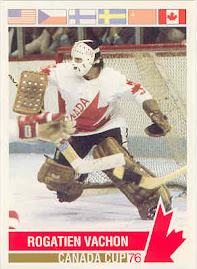
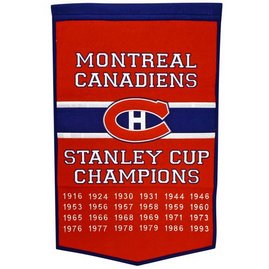







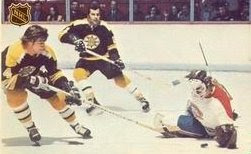



















































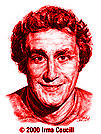



































































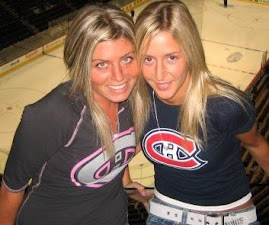


















8 comments:
Robert;
In reading over my copy of the Andy O'Brien book, there are two versions, "Firewagon Hockey" was published in the mid-1960's, while an updated version "Les Canadiens" was released in the aftermath of the 1971 playoffs.
The advantage to the O'Brien book as opposed to most books about the Canadiens history is his interview with Ambrose-O'Brien, the Habs first owner.
Ambrose-O'Brien owned Cobalt, Haileybury, and Renfrew. By founding the Canadiens he owned 4 of the league's 5 teams (J. Gardner owned the Wanderers).
Ambrose-O'Brien is quoted in the book, "The understanding was that the Canadiens franchise would be turned over to French sportsmen in Montreal as soon as practible."
tc.denault@habsworld.net
Thanks T.C.
I should actually have underlined this point you are bringing to my attention. J.A. O'Brien essentially was th NHA in 1909-10, it was never intentioned for him to go one owning Les Canadiens long term. It is of little wonder that owning four of five teams, and taking on such losses, that he went out of the hockey business so quickly - within a matter of years!
The big questions that I've always had, surround the amount of debt the Canadiens incurred, as compared to the other teams. That is where I am making the assumption that the CAC owners were transferred Haileybury instead of the Montreal franchise.
Just curious - is Andy O'Brien any relation to Ambrose?
As far as I know, there was no relation.
tc.denault@habsworld.net
It all depends on what you're going by, really.
This is the 100th year of the Montreal Canadiens Hockey Club. It's not the 100th year of the Montreal Canadiens hockey franchise.
In Europe, the Club belongs to the city/region. They don't believe that owners can really treat the team like a franchise. Look up Wimbledon FC for a clearer view of this... if a franchise is moved, it really starts over again.
The onwer may have moved out, but the club remained. That's what's important, really. People are taking modern NHL/North American pro sports standards and trying to apply them to the pre-NHL days. With several leagues in startup mode, it's really the clubs themselves that mattered back then.
The current Ottawa franchise came into existence in 1992, but they trace their roots to the team from this same time period. It's a bit iffy, it's more like how Sleeman's has been around for a couple hundred years in Canada, but only brewing consecutively since 1988 and was out of business from the time of US prohibition until then (they lost their liquor licence when they failed to report their beer sales to Al Capone).
Hey Robert, what a great text.
I will be brief, but I spoke with Léandre Normand. (btw, his book was written in Q4 2003, or maybe it's the version that I have).
He claims, loud and clear, that the Haileybury Comets was not transfered to George W. Kendall. But it's written twice in his book.
He also said that this will be removed from the upcoming book in November.
Trust me, it's unclear like crazy, and he also claimed that Trail for the Stanley is riddled with errors and should not be considered a valid source of information.
I'm even more confused.
Btw, as I wrote on BleacherReport, the idea of a french players only is a little bit untrue. The Canadiens were created to compete with the already existing francophone only team: The Montreal National.
The National refused to join the NHA at the beginning and the NHA decided to create a team to compete with that fan base.
So, what idea are we celebrating exactly?
To wade in with you big boys of Habs history...
It seems to me that there's a lot of semantics here. Aren't these facts the most important?
1) The Canadiens (name) was born in November 1909
2) Two franchises that could be the current day Canadiens were also added to the NHA in 1909
One thing I am certain of, the NHA (NHL) was born in November 1909. And, Montreal is the only city to have consistent representation in the league with the Canadiens (Club athletique, de hockey, whatever) being the only club that has had consistent representation.
Personally, I would go for the Halleybury origin and tack on two extra franchise wins...
I think one thing that will confuse most people is that the centenary is being celebrated in a very untraditional way, as you've noted. Usually, celebrations of anniversaries take place in the year during which the landmark anniversary occurs – that would be to say 1909 in this case. Canada's centennial was in 1967, The US bicentennial in 1976, the Stanley Cup centennial 1993.
The puzzling thing is starting the celebration early – in 2008. It is rather jumping the gun.
For example, shouldn't Montreal have tried to obtain the junior tournament for 2009-10, which would have marked the true 100th anniversary, almost to the month? And, shouldn't the main celebrations be taking place next fall, not this one?
In any case, a celebration is a celebration. Not many but a few sticklers refused to celebrate the millennium in 2000, when they suggested NYE 2000, not 1999, should have been the big night.
25 Cups in 98 opportunities. Why not go for it? Then we can have 27 in 100...
Daniel, this is getting to be like a comedy!
How can Leandre state such a thing when Ambrose O'Brien is to me the more solid of authorities.
Does Leandre have a little Rejean Tremblay in him?
Oddly, Le National is what Tremblay called the Nordiques lookalike team in "Lance Et Compte!"
To me still, anyway it is sliced, it is the 100th season and the 100 year anniversary of putting a professional hockey team in Montreal.
Topham, I never looked at it so simplistically as being the 100th anniversary of the name. I actually read what you said twice, and thought...why didn't I think of that?
100th season that the Canadiens name is used. Hum.
100th birthday of the Canadiens name. Hum.
Maybe I can buy that. But something is still fishy. I always receive closed doors when I touch this subject. Nobody wants to touch this with a 100-foot pole.
I need to put things down in order.
Robert, btw, in LGHDC (too long to type), George Kendall tried to purchase the Wanderers in 1908, not 1910, as you wrote. He failed, and O'Brien created a team before Kendall.
Why not simply support Kendall's idea instead of sidetracking him?
It still doesn't fly.
Btw, it seems that many french speaking canadians are owning english blogs or participating mostly on english forums.
I'm puzzled by this.
I founded CHFANS.COM with 2 friends back in 2003 but unfortunately we always had a disagreement on how things should run. That's why I created TRICOLORE.CA, to provide a site as I thought it should be run.
Why? Because the minority community of Canadiens fans, the english fans, always have the best online communities.
I always wanted to provide as good a community as our english counterparts. But I'm noticing more and more that some of our best french writers, contributors are also heavily involved in the english community.
Post a Comment